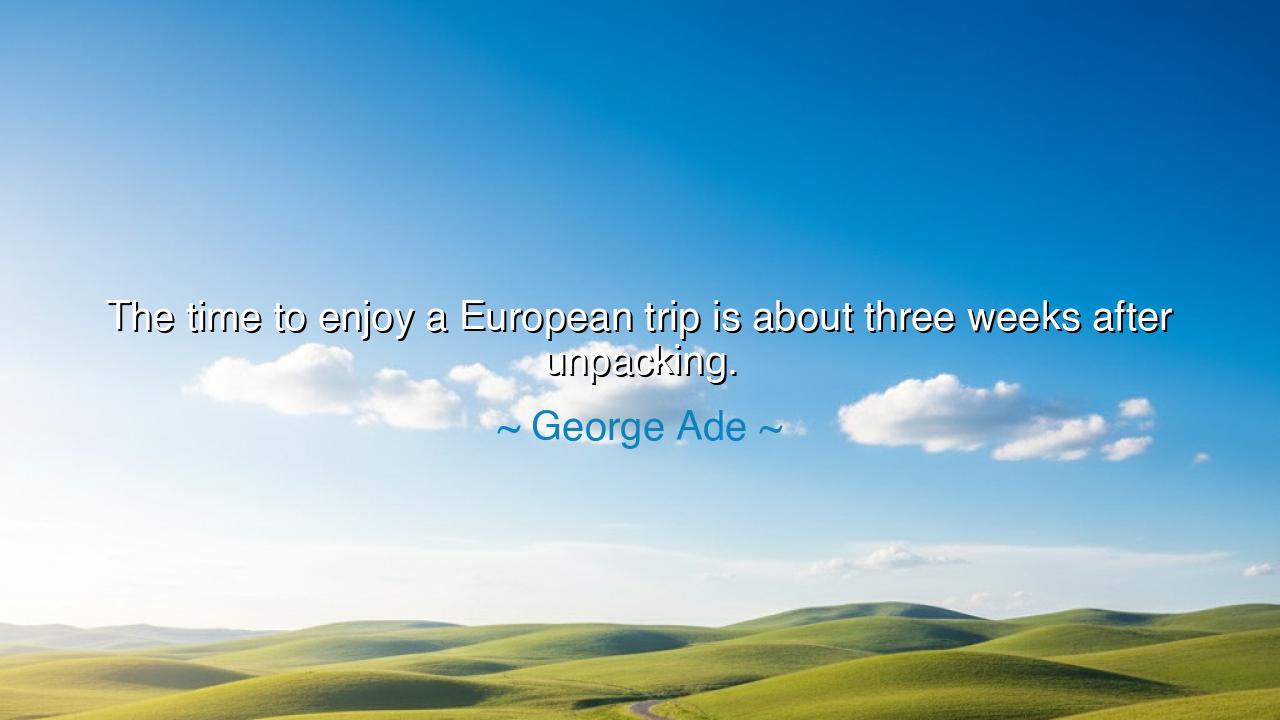
The time to enjoy a European trip is about three weeks after






Hear the wry wisdom of George Ade: “The time to enjoy a European trip is about three weeks after unpacking.” Though humorous on its surface, this saying contains the quiet truth that the full sweetness of a journey is rarely tasted in the moment itself. The burdens of travel—fatigue, confusion, discomfort, the strangeness of new places—often veil the joy. It is only when we return, when we are at rest, when memory has polished the rough edges of our experience, that we begin to savor the richness of where we have been.
To travel is to plunge into chaos: the bustling streets, the foreign tongues, the endless trains and timetables. In the midst of this, the soul is often too weary to appreciate fully. But when one has returned home, when the body has rested and the mind has quieted, then the images of the trip rise like treasures from the depths. The cathedral remembered in stillness is more glorious than when glimpsed in haste. The laughter of strangers echoes more sweetly when recalled than when drowned by noise. Thus Ade reminds us that the time to enjoy is not always the time of doing, but the time of remembering.
The ancients knew this truth. The poets of Greece often sang not of journeys in progress, but of journeys completed. Homer’s Odyssey is not a diary of struggle, but the song of return, where hardships are transfigured into legend. The bitterness of wandering became the glory of epic only in the retelling. So too in Rome, travelers to Greece or Egypt spoke not of weariness under the sun, but later boasted of the ruins and wonders they had seen, magnified in memory. The heart reshapes the trip after it has ended, making it richer than it seemed at first.
History offers countless examples. Consider the soldiers of Xenophon’s Ten Thousand, retreating through hostile lands. In the moment, their march was filled with exhaustion, hunger, and peril. Yet when Xenophon wrote his Anabasis, the struggle became glory: the vision of mountains crossed, rivers forded, enemies outwitted. What was misery in the living became triumph in the telling. Ade’s words echo this same transformation: travel may test us in the moment, but in hindsight, it becomes beauty.
There is wisdom here about the nature of memory itself. Human beings are not only creatures of experience, but creatures of reflection. Often, it is not the living of the moment but the savoring of it afterward that brings the deepest joy. The mind, in recalling, strips away the irritations, magnifies the beauty, and transforms the ordinary into the extraordinary. The European trip becomes not a blur of trains and tickets, but a gallery of sunsets, meals, and encounters etched into the heart.
The lesson is clear: do not despair if the present feels heavy. Trust that memory will distill the gold from the dust. Let your journeys, whether far or near, whether easy or burdensome, pass through the alchemy of time. What seems vexing today will glow tomorrow. Even hardship, once endured, becomes a story, and often the most difficult journeys are the richest in recollection.
Practically, this means: keep a journal, take notes, capture moments not for perfection now but for remembrance later. Do not measure a journey only by the smiles along the way, but by the treasure it will yield when you reflect upon it. Allow time to ripen your travels into meaning. For as Ade teaches, the enjoyment of the trip is not only in the doing but in the remembering, not only in the present but in the echo that follows.
Therefore, O children of the road, heed George Ade’s wisdom. The time to enjoy a journey is not only as you walk it, but in the quiet after it has ended. Treasure both the struggle and the story, both the dust of travel and the gold of memory. For the present may weary you, but memory will exalt you. And in this way, every trip becomes not only a passage through space, but a lasting inheritance in the soul.






AAdministratorAdministrator
Welcome, honored guests. Please leave a comment, we will respond soon